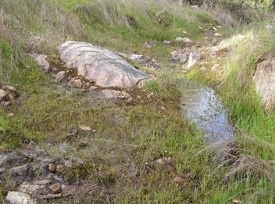
Features
Business/Policy
Environment
Environment Protection
Protection
Regulations
State
Sustainability
United States
Reduce risk of runoff during high-risk times
March 26, 2013 by Press release

March 26, 2013, Madison, WI – March is among the riskiest months in which to spread manure on fields because melting snow and rain can carry the manure into lakes, streams and groundwater. Farmers are advised to avoid spreading when the state’s online forecast predicts a high risk of run off, state agriculture and water quality officials say.
Farmers who don’t have enough storage capacity to avoid spreading manure during high-risk runoff times are encouraged to steer clear of high-risk fields and have a spill response plan in place, they say.
“We’re encouraging farmers to check the online runoff risk advisory forecast and avoid spreading when the risk is high,” says Sara Walling, water quality section leader with the Department of Agriculture, Trade and Consumer Protection. “Farmers who can’t avoid spreading can minimize runoff risks by avoiding sites that are prone to runoff.”
Wisconsin’s online runoff risk advisory system is part of the Wisconsin Manure Management Advisory System (exit DNR) that provides maps showing short-term runoff risk for daily application planning, and also maps for long-term application planning. It was developed by DATCP, the National Weather Service, U.S. Geological Service, and University of Wisconsin.
The runoff risk forecast is updated three times a day by the National Weather Service and takes into account soil moisture, weather and factors such as land cover and slope. Farmers can click on the runoff advisory map to display the specific risk assessment, precipitation reading and other information for their area, Walling says.
Farmers who don’t have enough storage to avoid spreading are encouraged to contact their crop consultants or county land conservation agents to help identify alternatives to spreading. Alternatives can include stacking the manure away from fields near lakes or rivers, and away from drinking water wells and areas with sinkholes or exposed bedrock.
If a farmer must land spread, conservation agents and crop consultants can help identify fields where the risk is lower that manure will run off when spread on those fields Farmers should be aware of the conditions on an individual field that may make spreading more or less risky than identified on the runoff advisory map.
“Farmers who do need to spread, should do so very carefully and identify conditions such as saturation, ice cover or areas of active melting that can make an individual field more susceptible to runoff,” says Jason Lowery, DNR spills team leader. “They also need to make sure they have a plan in place for who you’re going to call and the steps you’re going to take if runoff occurs or a spill happens.”
A DNR video, How to Respond to a Manure Spill, demonstrates a few simple steps and supplies that can help avoid or minimize problems for the farmer and for lakes, streams and groundwater. An example emergency spills plan that farmers can fill out and other tips and tools are found on DNR’s website by searching for manure spills response.
Under state law, spills must be reported immediately to the state spill hotline, 1-800-943-0003. The number is toll free and is available 24 hours a day.